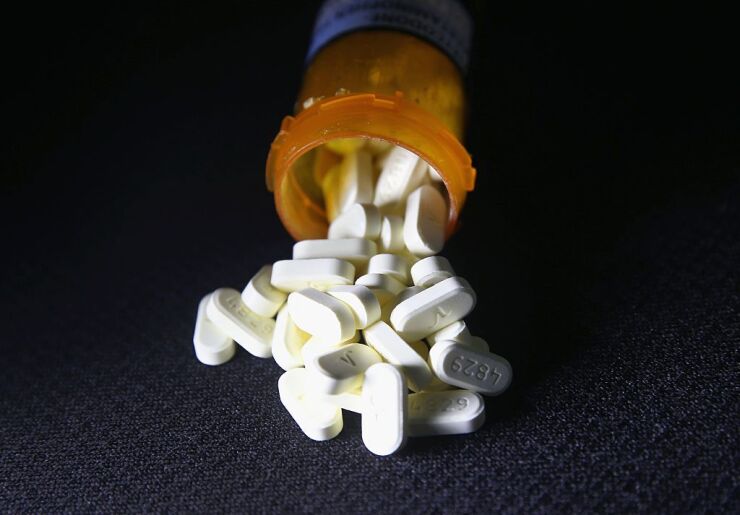A multibillion-dollar bill is coming due for the U.S. opioid epidemic and insurers for some of the largest drug makers, distributors and pharmacies are refusing to help pay for it.
A Delaware Supreme Court ruling in January has emboldened insurers eager to avoid massive policy claims from companies proposing to settle liability lawsuits over opioids. Half a dozen complaints have been filed in Delaware in the past two months, seeking court approval to block coverage of everything from cash damages to attorneys fees for companies including CVS Health and AmerisourceBergen.
Opioid companies agreed to pay more than $32 billion to help cover costs related to opioid addiction, which has killed an estimated 500,000 Americans over two decades. Insurers, including Hartford Financial Services Group and American International Group, took legal action after the Delaware court ruled Chubb didn’t have to pay to defend Rite Aid Corp. against thousands of lawsuits.
Read more:
“There certainly will be a short-term jump in the number of insurance companies filing suit in Delaware” because of the Rite Aid ruling, said Michael Miguel, a Los Angeles-based insurance lawyer with
Delaware courts are often a key venue for big-dollar business disputes. The state is the corporate home to more than half of U.S. public companies and more than 60% of Fortune 500 firms. If insurers are successful in denying claims, that could increase the financial burden on companies being targeted in more than 3,000 opioid suits by state and local governments.
The court fight centers on whether insurance claims can be denied if policy holders created a “public nuisance” by improperly marketing the addictive painkillers. That’s the allegation made by communities across the U.S. seeking compensation from drug manufacturers, distributors and pharmacies.
Read more:
Four of the new cases filed by insurers in Delaware target AmerisourceBergen, one of the largest U.S. drug distributors. State and local governments allege the company reaped billions of dollars in profit by ignoring red flags about unusually large shipments of the painkillers.
‘Not covered’
In its Feb. 11 Delaware lawsuit, a unit of Hartford Financial Services Group said it denied coverage for AmerisourceBergen after “conducting an investigation.” Because state and local governments “seek equitable relief in the form of nuisance abatement, which is not covered as damages under the policies,” Hartford said in court filings it wants a judge to affirm its denial of coverage.
Gabriel Weissman, an AmerisourceBergen spokesman, declined to comment on the insurer lawsuits. The company has offered to pay $6.4 billion to settle all its opioid litigation as part of a combined
In a Feb. 9 lawsuit, Greenwich Insurance Co.’s XL Insurance America unit said AmerisourceBergen sought at least $300 million in coverage for opioid defense costs, but no payment was made because the policy excludes public-nuisance claims. Similar suits were filed by American International Group’s National Union Fire Insurance Company of Pittsburgh and by Munich Reinsurance’s American Alternative Insurance.
Pharmacy chain CVS was the target of suits last month by National Union and by Chubb unit Ace Property and Casualty, which said it has “no obligation to defend or indemnify CVS in connection with” the opioid cases.
Counter-claim
CVS has since countersued Chubb and other insurers and is asking a Delaware judge to move all those cases to Rhode Island, said Mike DeAngelis, a spokesman for the pharmacy company. CVS is based in Woonsocket, Rhode Island.
In its Rhode Island countersuit, which names more than 50 insurers as defendants, CVS said it had purchased “hundreds of millions of dollars in liability coverage” annually from Chubb that should cover injuries consumers suffered from opioids.
Read more:
“Chubb denied coverage outright in or around 2018 and has not paid a single dollar toward the defense, settlement, or liability arising from any of the opioid lawsuits,” CVS lawyers said in a court filing. “For the years since then, Chubb rested on its coverage denial while CVS focused on defending the opioid lawsuits on its own.”
In January, pharmacy chain Rite Aid declined to comment on the Delaware Supreme Court ruling, and spokeswoman Terri Hickey didn’t respond to requests for comment on Friday.
Policy holders may yet prevail. While the Delaware ruling in January against Rite Aid has emboldened insurers to deny coverage, courts in other states have found general liability policies should cover nuisance claims.
“It’s not 100% clear the Delaware Supreme Court got this one right,” said Miguel, the California insurance lawyer. “It’s pretty out of character for them to take such a hard line on these kinds of issues.”






